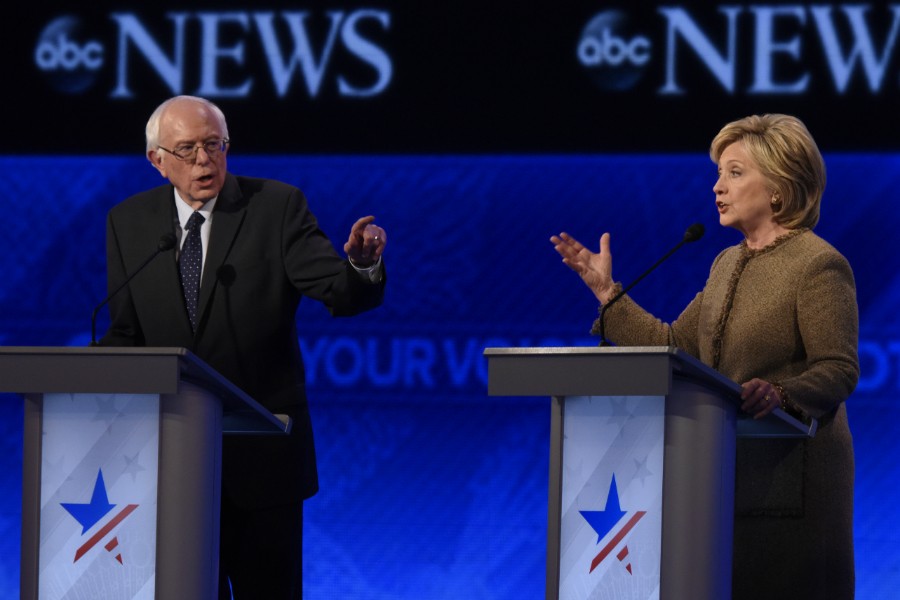Sanders, Clinton debate at The Whiting
IMAGE / Disney / ABC Television group on Flickr
U.S. Sen. Bernie Sanders (left) and Hillary Clinton, former secretary of state, debate during ABC News coverage of the Democratic presidential debate from St. Anselm College in Manchester, N.H. , Dec. 19.
Presidential candidates Bernie Sanders and Hillary Clinton went to The Whiting on Sunday, March 6, for a Democratic debate.
The two came to Flint because of the water crisis and answered many questions in regard to what actions would be taken to fix it.
In Sanders’ opening statement, he began by speaking about the things he has seen in Flint.
“What I heard and what I saw (in Flint) literally shattered me,” Sanders said, “and it was beyond belief that children in Flint, Michigan, in the United States of America, in the year 2016, are being poisoned. That is clearly not what this country should be about.”
Sanders said that nation needs to rebuilds its roads, bridges, and water systems. He said the wealthiest country in the world needs to get its priorities right.
Clinton began by saying she is grateful that a spotlight is being shined on Flint.
“We have to focus on what must be done to help the people of Flint,” Clinton said. “I support 100 percent the efforts by your senators and members of Congress to get the money from the federal government in order to begin the work that must occur to fix the infrastructure. The state should also be sending money immediately to help this city.”
Clinton and Sanders also said that Gov. Rick Snyder needs to be recalled from office for the things he has let happen to the city.
The two candidates answered many questions, but here are a few key questions:
LeeAnne Walters, former Kearsley student and Eclipse staff member, asked the question, Will you promise to require all public water systems to remove every lead service pipe throughout the U.S.?
Sanders was the first one to answer.
“I will make a personal promise to you that the EPA — and the EPA director that I appoint — will make sure that every water system in the United States of America is tested,” he said, “and that the people of those communities know the quality of the water that they are drinking, and that we are going to have a plan to rebuild water systems in this country that are not safe for drinking.”
Clinton agreed with Sanders.
“I agree completely,” she said, “I want to go further though. I want us to have an absolute commitment to getting rid of lead wherever it is because it’s not only in water systems — it’s also in soil and it’s in lead paint that is found mostly in older homes. That’s why 500,000 children today have lead, lead in their bodies.”
Clinton said she would commit to remove lead from everywhere in the next five years.
Bryn Mickle, editor of The Flint Journal, asked: Why should the people of Flint believe you aren’t using the toxic water crisis to score political points?
Clinton answered first.
“Throughout my public career I have been evening the odds for people however I could,” she said. “I worked throughout my time … to try to fix problems wherever I saw them. And this problem is one that is particularly outrageous and painful. At the same time … I’m just determined to do whatever I can …. I will be with Flint all the way through this crisis.”
Sanders was then asked what took him so long to come to Flint, and Sanders assured Mickle that he supported the city before his most recent visit.
“What I did is meet very quietly in Detroit with parents and others who were impacted by this disaster,” Sanders said, “and the second thing that I did is hold a town meeting — which was as nonpolitical as I could make it — for hundreds of people to tell me and the world, through the media, exactly what was happening here in Flint.
“All I can say is that if you check my record … I have stood with those who are hurting; I have stood with those who have no money, and I have taken on virtually every powerful special interest in the United States of America,” he said.
Mr. Gene Kopf, whose daughter was injured in the Kalamazoo mass shooting, wanted to know what the candidates would to do address the epidemic of mass shootings in the United States.
Clinton answered first, beginning with how happy she was that Kopf’s daughter is alive.
“On average, 90 people a day are killed by gun violence in our country. I think we have to try everything that works to try to limit the numbers of people, and the kinds of people, who are given access to firearms,” Clinton said.
“I believe so strongly, Gene, that giving immunity to gun makers and sellers was a terrible mistake,” she said. “We have created a culture in which people grab for guns all the time, and there’s got to be a way to have more warning signals and more efforts to try to stop that from happening.”
Sanders expressed how important it is to minimize the possibility of mass killings.
“I remember President Obama being on television maybe three months ago … and he — after the mass killing in Oregon, if my memory is correct — he said, ‘Look, to be honest with you, let’s be honest, nobody has a magic solution to this problem. Any lunatic tomorrow, any person could walk into a theater and do something horrific.’
“And you know what, for us to tell you that that absolutely will not happen would be untrue,” he said. “But what the president said, he said, ‘Look, this is a tough issue, but we have got to do everything we possibly can to minimize the possibility of these mass killings.’ Bottom line is: people who should not have guns in America should not be able to buy guns in America.”
Shoniqua Kemp, whose daughter goes to school in Detroit, asked: What are you going to do to immediately help children in broken schools?
Sanders thanked Kemp for being willing to stand up to the situation at hand.
“A great nation is judged not by how many millionaires and billionaires it has, but by how it treats the most vulnerable amongst us, and that is the children, and that is the elderly,” Sanders said. “We should be ashamed of how we treat our kids and our senior citizens …. We have got to change our national priorities — no more tax breaks for billionaires and large corporations. We are going to invest in our children and have the best public school system in the world.”
Clinton explained her views.
“Here is what I would do as president,” Clinton said. “Number one, I would reinstate a program we did have during the ’90s where the federal government provided funding to repair and modernize public schools because a lot of communities cannot afford to do that on their own.
“Secondly, I would use every legal means at my disposal to try to force the governor and the state to return the schools to the people of Detroit,” she said. “Number three, I want to set up inside the Department of Education … kind of an education SWAT team — if you will — where we’ve got qualified people: teachers, principals, maybe folks who are retired, maybe folks who are active, but all of whom are willing to come and help.”
In his closing statement, Sanders spoke about why the candidates were in Flint. He spoke about how the country has school systems that are collapsing, and yet the United States is the richest country in the world.
“We need, in this country, a political revolution where ordinary people stand up and reclaim the government that men and women fought and died for,” Sanders said.
Clinton explained why she was running for president in her closing statement. She let people know that America’s best days are ahead of us.
“I will do whatever I can as the Democratic nominee to run a campaign you will be proud of,” Clinton said.
The Michigan presidential primary is Tuesday, March 8, for all who wish to go out and vote.

Class: Senior
Extracurricular Activities: Drama Club, Thespian Society, National Honor Society
Sports: Soccer
Hobbies/Interests: Reading, Writing,...





